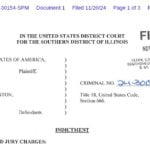Shelby Co. (ECWd) –
We covered the Shelby County State’s Attorney Ruth Woolery’s issuance of subpoenas to her client, the Shelby County Board Chairman Bobby Orman and the county’s auditing firm in this article.
Case law appears to point to a problem for this family law practitioner who chose to be a prosecutor, as do the local rules she is bound by.
Notably, the subpoenas issued by Mrs. Woolery states in both the subpoena to Bobby Orman and the County’s Auditor:
“Please send the requested documents along with a copy of this subpoena to Ruth Woolery, Shelby County State’s Attorney, Shelby County Courthouse, 301 E. Main Street, Shelbyville, Illinois 62565; statesattorney@shelbycouniy-il gov”. (emphasis added)
One recipient of Mrs. Woolery’s Subpoena is on the offensive asking the court to issue a Rule to Show Cause for misappropriating the power of the court because administrative subpoenas must be returned to the Court and not the State’s Attorney.
Another notable problem for Woolery is the fact state law outlines a court can not require a CPA to divulge this information.
(225 ILCS 450/27) (from Ch. 111, par. 5533)
(Section scheduled to be repealed on January 1, 2029)
Sec. 27. Confidentiality of licensee’s and registrant’s records. A licensed or registered CPA shall not be required by any court to divulge information or evidence which has been obtained in the licensee or registrant’s confidential capacity as a licensed or registered CPA. This Section shall not apply to any investigation or hearing undertaken pursuant to this Act. (emphasis added)
The Illinois Supreme Court pointed out in People v. Wilson distinguished rules for administrative subpoenas issued by a State’s Attorney and a subpoena issued by a Grand Jury.
In the current matter, it is clear a Grand Jury did not issue the subpoena because it does not say “Grand Jury Subpoena” on the document.
Grand Jury Subpoena points from the Illinois Supreme Court:
As pointed out in the auditor’s motion, “The grand jury has the power to issue subpoenas to obtain documents relevant to its inquiry when an individual is under investigation for a crime. (Ill. Rev. Stat. ch. 38, para. 112-4(b) (1991)). Grand jury subpoenas are returnable to the grand jury, similar to how a witness, who is subpoenaed by the grand jury, must report to the grand jury.” (emphasis added) “The grand jury has the power to disclose subpoenaed documents to the State’s Attorney for the purpose of the State’s Attorney’s furthering his responsibility of enforcing the law. (Ill. Rev. Stat. ch. 38, para. 112- 6(c) (1) (1991)).” Because the State’s Attorney could receive the Grand Jury material, the Court found harmless error when a Grand Jury Subpoena was returnable to the State’s Attorney as opposed to the Grand Jury.
State’s Attorney Subpoena points from the Illinois Supreme Court:
A State’s Attorney also has the power to subpoena documents. (Ill. Rev. Stat. ch. 38, para. 155-2 (1991)) . These administrative subpoenas, however, must be returnable to the court, so the court can determine whether the documents are relevant and material, whether the documents are privileged, and whether the subpoena is unreasonable or oppressive before the State’s Attorney has access to the documents.” (emphasis added) Otherwise, the People would be subject to a totalitarian government without checks and balances and the State’s Attorney would be at liberty to pry into the lives of private parties without any restraint. (Every State’s Attorney should know this rule of procedure.)
Here, Shelby County State’s Attorney, Ruth Woolery, failed to direct the return of the administrative subpoena to the Circuit Court as mandated by the Illinois Supreme Court in People v Wilson. In doing so Mrs. Woolery thumbs her nose at the Circuit Court and we the People by circumventing the protections afforded all of the People. The Illinois Supreme Court clearly spells out the reasons, which are “so the court can determine whether the documents are relevant and material, whether the documents are privileged, and whether the subpoena is unreasonable or oppressive before the State’s Attorney has access to the documents.”
According to Woolery, as clearly typed on the top of the subpoena, she indicates Shelby County as being part of the Sixth Circuit Court, which it is not. Shelby County is part of the Fourth Circuit Court, along with Christian, Clay, Clinton, Effingham, Fayette, Jasper, and Montgomery counties.
Now Pending before the Shelby County Circuit Court is a Motion to Quash the Subpoena issued to Benford Brown and Associates. Not only is Mrs. Woolery facing a motion to quash, but she is also facing a Petition for Rule to Show Cause why she should not be held in contempt of Court for misappropriating the power of the court by creating a non-grand jury subpoena returnable to Ruth Woolery, Shelby County State’s Attorney.
We asked the State’s Attorney for comment yesterday morning, specifically, “Can you point to any case law that overturns the People v. Willson, 164 Ill. 2d 436 (Ill. 1994) 647 N.E.2d 910 as it relates to where the requested documents are to be provided when a State’s Attorney issues a subpoena?” As of the time of publication, she has not responded.
The motion to quash filed with the court can be viewed below or by downloading at this link.
MOTION TO QUASH AND FOR SANCTIONS File Stamped copy








2 Comments
Droopy: Master Sergeant
Posted at 15:12h, 15 AugustHas anyone questioned why the clerk of the court signed a document that clearly has the wrong circuit court?
G. Grego
Posted at 15:08h, 14 AugustWoolery or Wooly; why’d she take the job since she can’t handle it?